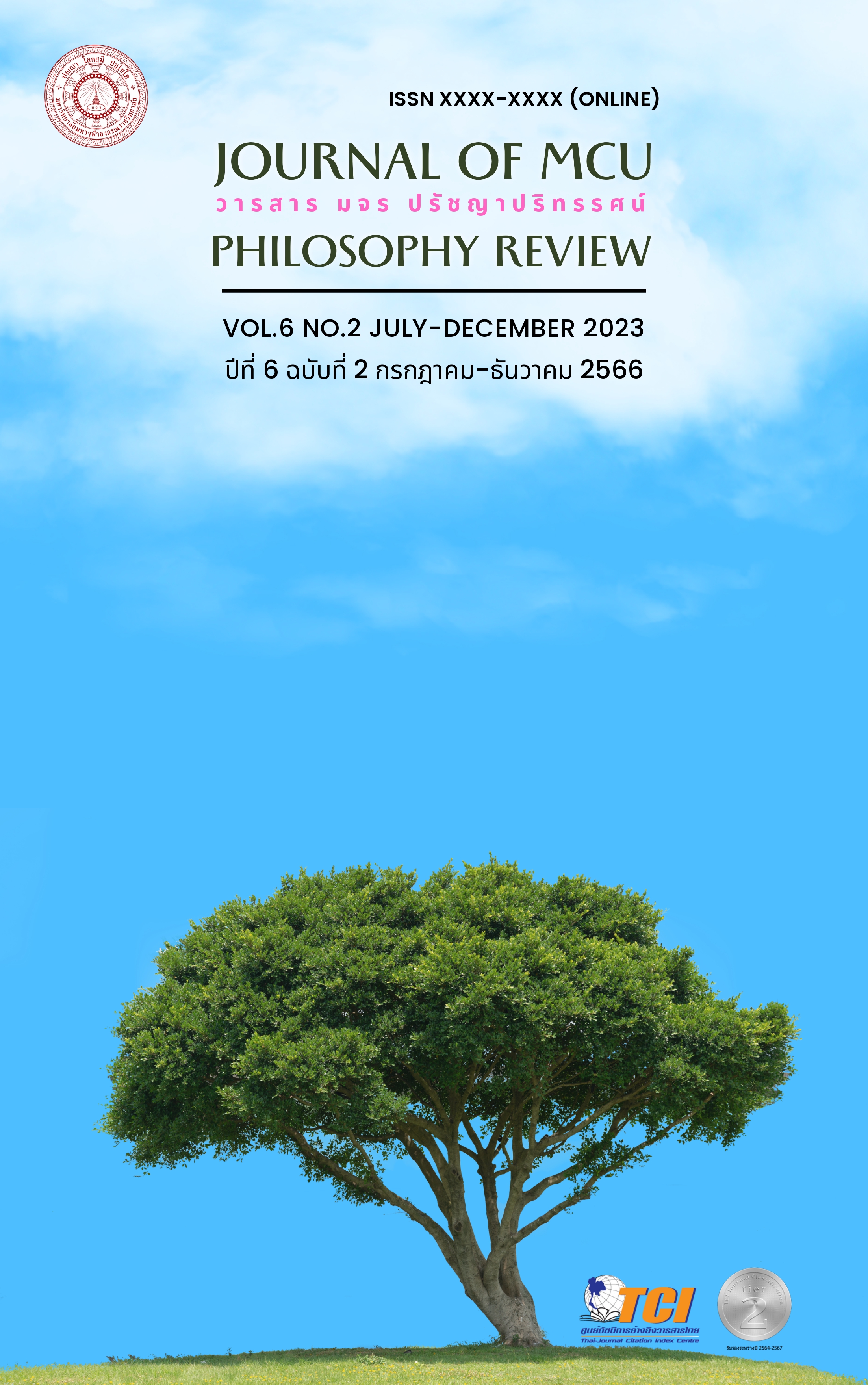Creating Economic Status According to the Ways of the Millionaires in Theravada Buddhist Scriptures
Main Article Content
Abstract
This research article aimed: 1) to study the historical background of wealthy individuals, 2) to examine the fundamental principles of Buddhist ethics that manifest in the lives of these wealthy individuals, and 3) to investigate the strategies for economic development pursued by these wealthy individuals. This research employs a document-based approach, utilizing content analysis to extract knowledge and insights presented in Buddhist scriptures. The study's findings indicate that in terms of historical context, Chulantewasika, a wealthy individual, emphasized intelligence, visionary insight, diligence, and ethical values as the inseparable significant factors in wealth creation, Anathapindika, known for his generosity, consistently donated to the less fortunate and supported Buddhist monks, Kosaka experienced various life transformations due to past karma, ultimately becoming a wealthy magnate, Kumbha Kosaka, his son, left home during an epidemic, returned frugal, diligent, and virtuous, transforming into a magnate, and Mentaka, despite hardships, found a comfortable life by adhering to virtuous actions and became an exemplary figure for learning and practice. As regards the fundamental principles of Buddhist ethics, Chulantewasika emphasized principles such as integrity, a merchant's heart, and the principle of wise investment, Anathapindika followed the principle of generosity through both material and ethical donations, Kosaka pursued principles of non-binding of negative Kamma and the practice of forgiveness, Kumbha Kosaka embodied the four types of Iddhipãda, and Mentaka's approach was rooted in the fundamental principle of accumulating virtuous deeds and adhering to Buddhist principles, leading to spiritual progress and the creation of merit. In terms of strategies for economic development, Chulantewasika focused on financial knowledge and investment to generate wealth. Anathapindika emphasized determination and successful completion of endeavors. Kosaka abstained from negative actions, practiced ethical conduct, and cultivated the foundations of spiritual progress. Kumbha Kosaka’s approach involved maintaining financial stability, ethical profession, and avoiding extravagance. Mentaka exhibited endurance through life's challenges and consistent dedication to virtuous actions.
Article Details

This work is licensed under a Creative Commons Attribution-NonCommercial-NoDerivatives 4.0 International License.
บทความที่ได้รับการตีพิมพ์เป็นลิขสิทธิ์ของวารสาร มจร ปรัชญาปริทรรศน์
ข้อความในบทความที่ได้รับการตีพิมพ์ในวารสาร ถือเป็นความรับผิดชอบของผู้เขียนบทความ และข้อคิดเห็นนั้นไม่ถือว่าเป็นทัศนะและความรับผิดชอบของกองบรรณาธิการวารสาร มจร ปรัชญาปริทรรศน์
References
คณาจารย์มหาวิทยาลัยมหาจุฬาลงกรณราชวิทยาลัย.(2560). พระไตรปิกฎกวิเคราะห์. กรุงเทพมหานคร: โรงพิมพ์มหาจุฬาลงกรณราชวิทยาลัย.
พงศ์พันธ์ จันทรวราทิตย์. (2522). “บทบาทของเศรษฐีที่ปรากฏในพระไตรปิฎก”. วิทยานิพนธ์อักษรศาสตร มหาบัณฑิต. บัณฑิตวิทยาลัย: จุฬาลงกรณ์มหาวิทยาลัย.
พระครูอาทรวนกิจ (อนาลโย/ฉันทสิริกุล). (2557). “การศึกษาวิเคราะห์แนวคิดเรื่องหลักทิฏฐิธัมมิกัตถประโยชน์ในพระพุทธศาสนาเถรวาทกับการแก้ปัญหาสังคมไทย”. วิทยานิพนธ์พุทธศาสตรดุษฎีบัณฑิต สาขาวิชาพุทธศาสนา. บัณฑิตวิทยาลัย: มหาวิทยาลัยมหาจุฬาลงกรณราชวิทยาลัย.
พระจิรวัฒน์ อภินนฺโท.(2557). “วิเคราะห์ผลกรรมของเศรษฐีที่ปรากฏในพระพุทธศาสนาเถรวาท”. วิทยานิพนธ์พุทธศาสตรมหาบัณฑิต สาขาวิชาพระพุทธศาสนา. บัณฑิตวิทยาลัย: มหาวิทยาลัยมหาจุฬาลงกรณราชวิทยาลัย.
พระพรหมคุณาภรณ์ (ป.อ.ปยุตฺโต). (2559). พจนานุกรมพุทธศาสตร์ ฉบับประมวลธรรม. พิมพ์ครั้งที่ 34. กรุงเทพมหานคร: โรงพิมพ์พระพุทธศาสนาของธรรมสภา.
พระมหาดาวสยาม วชิรปญฺโญ. (2557). ประวัติศาสตร์พระพุทธศาสนาในอินเดีย. พิมพ์ครั้งที่ 4. กรุงเทพมหานคร: โรงพิมพ์บริษัทเอกพิมพ์ไทจำกัด.
พระมหาบุญไทย ปุญฺญมโน. (2564). การศึกษาเชิงวิเคราะห์แนวคิดทางจริยศาสตร์ในคัมภีร์ธรรมบท. วารสารบัณฑิตศาส์นมหาวิทยาลัยมหามกุฎราชวิทยาลัย. 19(2), 274-282.
พระมหาสุวรรณ สุวณโณ (จุลพงษ์).(2554). “ศึกษาเปรียบเทียบบทบาทของเศรษฐีที่ปรากฏในพระไตรปิฎกกับในสังคมไทยปัจจุบัน”. วิทยานิพนธ์พุทธศาสตรมหาบัณฑิต สาขาวิชาพระพุทธศาสนา. บัณฑิตวิทยาลัย: มหาวิทยาลัยมหาจุฬาลงกรณราชวิทยาลัย.
ไพโรจน์ ศุภทีปมงคล. (2548). “การศึกษาวิเคราะห์บทบาทของจิตตคหบดีอุบาสกที่ปรากฏในคัมภีร์พระพุทธศาสนา”. วิทยานิพนธ์พุทธศาสตรมหาบัณฑิต สาขาวิชาพระพุทธศาสนา. บัณฑิตวิทยาลัย: มหาวิทยาลัยมหาจุฬาลงกรณราชวิทยาลัย.
มหาจุฬาลงกรณราชวิทยาลัย. (2539). พระไตรปิฎกภาษาไทย ฉบับมหาจุฬาลงกรณราชวิทยาลัย.กรุงเทพมหานคร: โรงพิมพ์มหาจุฬาลงกรณราชวิทยาลัย.
แม้นเหมือน สิทธิศักดิ์. (2561). การประยุกต์หลักอริยสัจ 4 สำหรับการพัฒนาตนและพัฒนางาน. วารสารวิชาการสถาบันพัฒนาพระวิทยากร, 1(1), หน้า 54-66.
รังษี สุทนต์. (2544). “การศึกษาวิเคราะห์บทบาทของอนาถบิณฑิกอุบาสกที่ปรากฏในคัมภีร์”. วิทยานิพนธ์พุทธศาสตรมหาบัณฑิต สาขาวิชาพระพุทธศาสนา. บัณฑิตวิทยาลัย:มหาวิทยาลัยมหาจุฬาลงกรณราชวิทยาลัย.
สมเด็จพระพุทธโฆษาจารย์ (ป.อ.ปยุตฺโต). (2559). พจนานุกรมพุทธศาสน์ ฉบับประมวลศัพท์. พิมพ์ครั้งที่ 32. กรุงเทพมหานคร: สำนักพิมพ์ผลิธัมม์.
สุภัค มหาวรากร. (2561). การประยุกต์ใช้หลักธรรมในชีวิตประจำวันจากทศชาติชาดก. กรุงเทพมหานคร:สำนักงานคณะกรรมการวิจัยแห่งชาติ.


